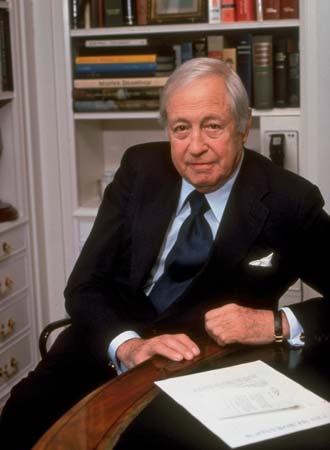Paley, William S.
American executive
born Sept. 28, 1901, Chicago, Ill., U.S.
died Oct. 26, 1990, New York, N.Y.
 American broadcaster who served as the Columbia Broadcasting System's (CBS Corporation) president (1928–46), chairman of the board (1946–83), founder chairman (1983–86), acting chairman (1986–87), and chairman (1987–90). For more than half a century he personified the power and influence of CBS.
American broadcaster who served as the Columbia Broadcasting System's (CBS Corporation) president (1928–46), chairman of the board (1946–83), founder chairman (1983–86), acting chairman (1986–87), and chairman (1987–90). For more than half a century he personified the power and influence of CBS.Paley was the son of immigrant Ukrainian Jews who conducted a thriving cigar business in Chicago. (At age 12 he added a middle initial to his name, the S.) The family moved to Philadelphia when Paley was ready for college, and he attended the Wharton School of Finance at the University of Pennsylvania (B.S., 1922). After entering the family's new cigar business, he became vice president and eventually signed an early radio advertising contract for the firm's products. The commercials boosted business, making Paley aware of the power of radio as an advertising medium, and in 1927 he invested in a relative's small radio network, the Columbia Phonographic Broadcasting System; Paley became president of Columbia on Sept. 26, 1928, moved to New York City, and quickly signed up 49 radio stations. (CBS dropped the word Phonographic from its name in 1929.) In the subsequent decades Paley built CBS into one of the world's leading radio and television networks, hiring such entertainment stars as Bing Crosby, Kate Smith, George Burns and Gracie Allen, the Mills Brothers, Will Rogers, Eddie Cantor, Bob Hope, and Jack Benny, luring some of them from rival networks.
During World War II Paley served the U.S. government as supervisor of the Office of War Information (OWI) in the Mediterranean, and later as chief of radio in the OWI's Psychological Warfare Division (1944–45), finally becoming deputy chief of the Psychological Warfare Division.
During and after the war Paley supported and encouraged Edward R. Murrow in building an outstanding news staff for CBS. Also in the postwar era Paley built CBS studios on both the east and west coasts and produced several successful television game shows, comedies, and westerns, including I Love Lucy, Gunsmoke, and Arthur Godfrey's and Ed Sullivan's variety shows. Paley exercised firm control over major programming and, in 1966, waived the CBS mandatory retirement rule so that he could remain active as chairman of the board. He remained chairman until 1983 and, after some CBS infighting, returned in 1987.
Paley and his second wife, Barbara (“Babe”) Paley (née Cushing), whom he married in 1947, became a centre of New York society, giving lavish parties and holding important philanthropic positions. Paley was a longtime president and trustee of the Museum of Modern Art (Modern Art, Museum of) and also built a large art collection of his own, ranging from Paul Cézanne and Pablo Picasso to Jackson Pollock.
- Dame Kiri Te Kanawa
- Dame Leonie Judith Kramer
- Dame Maggie Smith
- Dame Maggie Teyte
- Dame Margaret; and Kendal Kendal, William Hunter
- Dame Margaret; and Kendal, William Hunter Kendal
- Dame Margaret Rutherford
- Dame Margot Fonteyn
- Dame Marie Rambert
- Dame Marie Tempest
- Dame Millicent Garrett Fawcett
- Dame Muriel Spark
- Dame Myra Hess
- Dame Nellie Melba
- Dame Ninette de Valois
- Dame Peggy Ashcroft
- Dame Peggy van Praagh
- Dame Rebecca West
- Dame Rie, Lucie
- Dameron, Tadd
- Dame Rose Macaulay
- dame school
- Dame Shirley Bassey
- dame's rocket
- Dame Sybil Thorndike